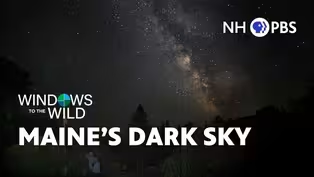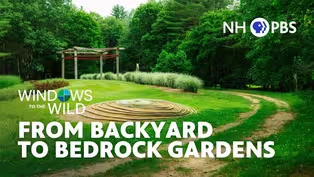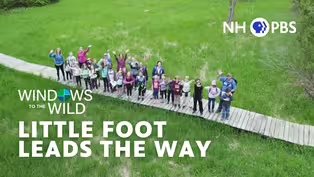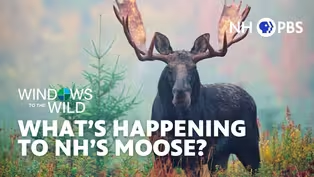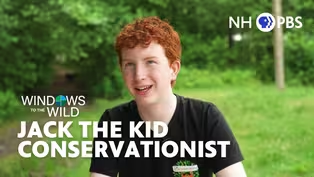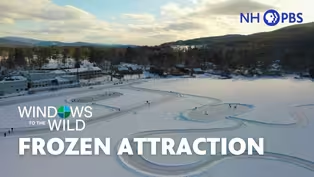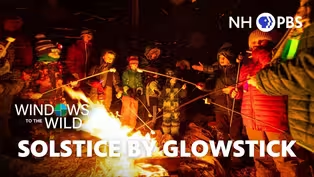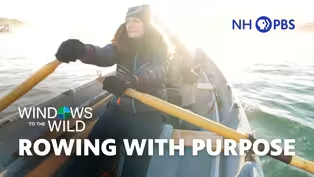Windows to the Wild
The You Can Do It Gardener
Special | 11m 18sVideo has Closed Captions
The You Can Do It Gardener helps people grow confidence and joy in their own backyards.
After 30 years in nonprofit finance, Jess Zander traded spreadsheets for soil. Now she’s the You Can Do It Gardener—coaching people to grow confidence alongside their plants. With a mix of practicality and passion, she helps others turn confusion into clarity and turn their outdoor spaces into places they truly enjoy.
Problems playing video? | Closed Captioning Feedback
Problems playing video? | Closed Captioning Feedback
Windows to the Wild is a local public television program presented by NHPBS
Windows to the Wild
The You Can Do It Gardener
Special | 11m 18sVideo has Closed Captions
After 30 years in nonprofit finance, Jess Zander traded spreadsheets for soil. Now she’s the You Can Do It Gardener—coaching people to grow confidence alongside their plants. With a mix of practicality and passion, she helps others turn confusion into clarity and turn their outdoor spaces into places they truly enjoy.
Problems playing video? | Closed Captioning Feedback
How to Watch Windows to the Wild
Windows to the Wild is available to stream on pbs.org and the free PBS App, available on iPhone, Apple TV, Android TV, Android smartphones, Amazon Fire TV, Amazon Fire Tablet, Roku, Samsung Smart TV, and Vizio.
Providing Support for PBS.org
Learn Moreabout PBS online sponsorshipMore from This Collection
Watch the individual stories from Season 20, digital first.
Video has Closed Captions
Stargazers gather in Maine’s darkest skies to celebrate and protect the night. (7m 29s)
From Backyard to Bedrock Gardens
Video has Closed Captions
In NH, a husband‑and‑wife’s backyard project becomes a magical public garden that delights. (13m 54s)
Video has Closed Captions
Young NH hiker “Little Foot” helps launch a school club to get more kids outdoors. (9m 48s)
What's Happening to NH's Moose?
Video has Closed Captions
Moose face rising challenges in NH—but they remain an icon of the northern forest. (7m 59s)
Video has Closed Captions
A New Hampshire teen speaks up for orangutans—and ends up at British Parliament. (10m 24s)
Video has Closed Captions
Willem visits Lake Morey to explore a 4.3-mile ice trail and the community behind it. (9m 19s)
Video has Closed Captions
A glowstick hike brings all ages together to explore nature on the longest night. (10m 7s)
Video has Closed Captions
Nicolle Littrell rows Maine’s coast to connect herself and others to nature and place. (10m 25s)
Providing Support for PBS.org
Learn Moreabout PBS online sponsorshipThis is great.
I used to think this was a weed until I learned it was a pollinator.
So we leave all of that now.
It's like everywhere.
My name is Jessica Zander, and I, started You Can Do It Gardening, which is a garden coaching business, in the spring of 2022 while I was still working at YWCA Boston YW Boston.
Before her gardening business grew, Jessica spent more than 30 years working in the nonprofit world.
During that time, she could be found here, here, and here.
Gardens were a place where Jessica felt at home.
And it's where the seeds of a new career were planted.
Were you also thinking of a rose here?
And I was helping people informally and, you know, and that was fun and fulfilling.
And then I was at a friend's house in the fall of 2021 and, you know, looking back, looking at her garden, thinking, you know, or her backyard, really.
It wasn't a garden.
What are you doing back here?
You know, which you only ask if you have a sense that something could be done.
This all used to be grass.
All of this.
Like, there was very little on the property when we got here.
Her instincts were spot on.
Jessica had the knowledge and confidence to coach 30 plus years in the garden, and a family history helped.
Her grandfather worked as a gardener in England, and it was her parents passion.
I think it's just in my family and my parents were British, so that's also a little different in terms of orientation.
And I think a lot of Americans don't necessarily grow up in an environment where gardening is a thing.
And especially folks in communities where landscapers are prevalent, that they just have no idea because they didn't watch it happening.
I don't know what it's called.
Somebody told me they thought it was horse nettle.
Jessica blended her knowledge of how to grow things with a passion to teach.
Now, you may or may not know this.
I'm not judging, but do you.
Are you aware that this is invasive?
The burning bush.
The result is a business.
You can do it.
Gardening.
I launched it in the spring of 2022.
And, you know, I really enjoyed it.
I had a good year.
It was just a start.
And then 2023 in the winter is when things just totally took off.
And then so like March, February, March.
And then, you know, by June I had left my job.
See, like, wild violets everywhere.
And, and the woodruff.
Yeah, sweet woodruff.
Careful of the stumps.
These are our old fruit trees that didn't work out.
So, my goal is just to help people feel empowered and informed.
Jessica built a website and now has an impressive social media following.
Very shady.
No irrigation, crappy soil.
Everything's going against you right now.
So the social media thing is funny because I wasn't on any of these platforms.
I'm really a private person, actually.
And I didn't know how how any of them worked.
You know, I was really resistant.
But then I kind of realized, okay, for clients, prospective clients, I should probably have a social media account as a business, you've got a ton of pruning to do here.
You know, it's like, all around the property, everywhere you look, it's like, oh, man, that needs attention.
Oh, geez.
That does, that does.
It's like a pinball.
Like, oh God, what do I do?
So, you know, it's you wait on the flowering stuff because they're about to bloom.
So I started an Instagram account.
Then I did a course that was really helpful to get kind of get out there, and then things just exploded.
I did TikTok then and Facebook, and things just exploded.
Okay, get rid of this.
Get rid of this alberta spruce.
Kill the wisteria if you possibly can.
More than 900,000 curious gardeners from around the world watch her videos and ask questions.
I think I'm just so elated, you know?
I mean, so few people get to, you know, sort of transition from a passion into a profession.
And I really came at this field sideways.
You know, I didn't have this horticulture background.
So, but it doesn't matter because I'm not out here being an expert in horticulture or an expert in ecology or, you know, I'm not a biologist.
But I think what, what I like to do is just empower people.
Yeah.
You got a forsythia thicket here.
It's seven at least.
Maybe two originally.
This is very simple.
First of all, when they get low like this, they root, and then they spread.
So then, you know, if people can just watch and get little hints and tips, then they can go off and do it in their own yard.
Would you be open to moving this?
Sure.
Because these are very close.
Okay.
And this gets huge.
Okay.
And this can get big.
Okay.
When she's not tending her own gardens, Jessica loves to visit other people's.
Yeah.
There's your free plan.
How much sun does this get?
This area.
Afternoon.
Okay, we start over there and over here.
Okay, great.
So it's not full sun?
No.
Okay.
So that's good for the azalea.
I love it because they're fellow gardeners.
Like we're kindred spirits.
You know?
They're into it.
I'm into it.
They're like friends.
We're all, like, the same.
You know what I mean?
But if you want this.
This is how big an area do you think this is?
It's.
To me, it looks bigger than this.
Roughly the same.
Okay.
I don't think it's bigger.
Okay.
And then I'm learning all the time.
Like any gardener.
I'm learning all the time.
I learn from comments.
I learn from clients.
I learn from the research I do.
So I think, I mean, just I feel so incredibly fortunate to be able to do this.
Every day, you know, I get to talk about gardening all day.
It's really awesome.
You've got a bunch of little invasives back here.
So here's what you do.
You're new here.
You ID everything on the property.
So you know what it is.
One of the common things people have questions about is gardening insecurities.
People get scared.
They're scared they're going to kill the plant.
It's extremely unlikely that you're going to kill a plant from pruning.
But you've got a cut in little windows so that the light can come in.
So what I try to show is, look, you can do this radical pruning.
You can do much more than you think.
And the plant is fine.
If you cut in little a little window here.
I'm just doing this quickly.
Like this.
See how there's just a teeny bit of a window?
I'm just very pragmatic, just from my own experience.
And also very experimental.
So I'm not afraid to do things that may or may not work out.
Like I'll transplant in the 90s, you know, when it's really, really hot.
So then you have to water a lot, you know, and that's okay.
It's just more work.
But you can still do it.
And so I think finding a balance for each person about how much they want to take on is also really key.
Because if you if you take on too much, it becomes a burden and then you can't keep up with it.
And then, you know, it's like, I hate gardening.
All right, here's your flowering shrub.
Insert name here.
It doesn't matter.
Best time to prune for you to get as many flowers as possible the following year is right after it blooms.
We're all on a journey.
You know, we all start as beginners at some point.
And then we progress and we learn.
And as we evolve our esthetics may evolve, you know?
So.
This right here is wood sorrel.
So this, this you can put in your salad if you need that.
I'll get another one.
It looks like clover, but it isn't.
See how it's different.
As Jessica's own backyard evolves, so does her connection with nature.
So I think my esthetic has also evolved out of my understanding or my continued like learning about how my yard is connected to the broader ecosystem.
And before I had, I really wasn't making that connection.
And there wasn't a lot that was valuable on the property.
So now as I bring more in and I see my first monarch caterpillar, for example, and I'm giddy with excitement like a new mom, you know, like my little caterpillar.
You feel the connection deeply, and then you want more of that, like, oh, let me bring in more native plant.
I want to know that what I'm creating in this environment is ecologically useful and productive.
This over there, you're going to move the hydrangea forward a little bit because it's smushed already a little bit with the winter berry.
The other winter berry here, the male.
As a coach, online and in-person, Jessica's enthusiastic approach to gardening is contagious.
We all won't have yards that look this nice.
She doesn't expect that.
What she hopes for is that in your own way, at your own pace, you discover the joy that she finds out here.
I just think the big picture thing is like, don't be afraid, don't be intimidated.
There is conflicting information out there on the internet.
There's rules that people think are necessary to share, like only do a third of this or only do you know at this time of year.
I don't think that's helpful.
I'm not saying I'm not wanting to contradict research papers.
I'm just saying we're not living in a research paper environment.
All of us.
We're not.
We're living real lives.
We have constraints on our time.
Or maybe we want to just wing it a little more.
And I think so.
My message is like, just go for it.
Try it.
Hey, you may fail sometimes something may die.
I mean, occasionally things die or I'll buy something and the bunnies eat it.
Okay, that's some feedback.
That's feedback like, all right, I've got to learn from that and incorporate that in and then do something different.
So I think people just need to feel more freedom and joy.
You just told me that you don't have a green thumb, but I don't really think there is such a thing.
I think there's experience.
And when you get experience, you get a little more confident.
But you should not talk yourself out of your abilities.
You know what I mean?
We should just go in and try it and see what happens.
And then your thumb will get greener and greener.
I love it.
Support for PBS provided by:
Windows to the Wild is a local public television program presented by NHPBS
